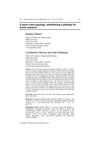 26 citations,
November 2006 in “Pharmacology, Biochemistry and Behavior”
26 citations,
November 2006 in “Pharmacology, Biochemistry and Behavior” Pregnancy reduces anxiety in rats, but finasteride reverses this effect.
 25 citations,
June 2017 in “Scientific reports”
25 citations,
June 2017 in “Scientific reports” Stress worsens Tourette symptoms by increasing allopregnanolone levels.
 25 citations,
May 2012 in “Journal of The European Academy of Dermatology and Venereology”
25 citations,
May 2012 in “Journal of The European Academy of Dermatology and Venereology” Many Korean patients with hair loss, skin allergies, and psoriasis use alternative medicine, but satisfaction is low.
 25 citations,
November 2008 in “Ophthalmic Plastic and Reconstructive Surgery”
25 citations,
November 2008 in “Ophthalmic Plastic and Reconstructive Surgery” Radiofrequency and scalpel incisions have similar clinical outcomes for upper eyelid surgery.
 24 citations,
June 2021 in “Journal of the European Academy of Dermatology and Venereology”
24 citations,
June 2021 in “Journal of the European Academy of Dermatology and Venereology” Use specific tools to measure quality of life in alopecia areata patients and improve future treatments.
 24 citations,
July 2019 in “Cochrane library”
24 citations,
July 2019 in “Cochrane library” Some treatments like methotrexate with prednisone might help juvenile morphea, but more research is needed to confirm.
 24 citations,
July 2018 in “Stem cells”
24 citations,
July 2018 in “Stem cells” Runx1 controls fat-related genes important for normal and cancer cell growth, affecting skin and hair cell behavior.
 24 citations,
June 2018 in “Expert Review of Pharmacoeconomics & Outcomes Research”
24 citations,
June 2018 in “Expert Review of Pharmacoeconomics & Outcomes Research” Microneedle technology is beneficial for drug delivery and could make vaccinations cheaper and more accessible.
 24 citations,
May 2015 in “Schizophrenia Research”
24 citations,
May 2015 in “Schizophrenia Research” A drug improved schizophrenia-like symptoms in stressed rats by changing brain steroid levels.
 24 citations,
August 2005 in “Health and Quality of Life Outcomes”
24 citations,
August 2005 in “Health and Quality of Life Outcomes” Women with androgenetic alopecia experience worse physical well-being and quality of life, but similar mental health compared to those without it.
 24 citations,
May 1995 in “Journal of Adolescent Health”
24 citations,
May 1995 in “Journal of Adolescent Health” Inner city teens had high retention rates for the contraceptive implant, especially those with a history of abortion.
 23 citations,
October 2018 in “Expert Opinion on Drug Safety”
23 citations,
October 2018 in “Expert Opinion on Drug Safety” Consider benefits and risks of new alopecia treatments for safety.
 23 citations,
April 2017 in “Clinical, Cosmetic and Investigational Dermatology”
23 citations,
April 2017 in “Clinical, Cosmetic and Investigational Dermatology” Dermatologists should screen for and manage psychological issues in patients with skin conditions to improve their quality of life.
 23 citations,
May 2016 in “American Journal of Pathology”
23 citations,
May 2016 in “American Journal of Pathology” The research suggests that a specific skin gene can be controlled by signals within and between cells and is wrongly activated in certain skin diseases.
 23 citations,
June 2014 in “Journal of Pharmaceutical Sciences”
23 citations,
June 2014 in “Journal of Pharmaceutical Sciences” Finasteride cream helps hair growth with less side effects.
 23 citations,
December 2013 in “British Journal of Dermatology”
23 citations,
December 2013 in “British Journal of Dermatology” A new gene mutation linked to a skin condition was found in a Spanish family.
 23 citations,
December 2009 in “International Journal of Sport Management and Marketing”
23 citations,
December 2009 in “International Journal of Sport Management and Marketing” The document concludes that future research should focus on tailored solutions for managing sports crises and consider legal and cultural factors.
 23 citations,
July 2007 in “The journal of investigative dermatology/Journal of investigative dermatology”
23 citations,
July 2007 in “The journal of investigative dermatology/Journal of investigative dermatology” Hair follicle bulge cells don't help skin regrow after glucocorticoid damage; interfollicular epidermis cells do.
 23 citations,
December 2006 in “Evaluation and Program Planning”
23 citations,
December 2006 in “Evaluation and Program Planning” The document suggests a new model for evaluating public research that better captures the full value of knowledge creation and use, using PCOS research as an example.
 23 citations,
January 2001 in “Chemical & Pharmaceutical Bulletin”
23 citations,
January 2001 in “Chemical & Pharmaceutical Bulletin” New pregnane derivatives are effective at inhibiting an enzyme linked to hair loss and reducing oil gland activity.
 23 citations,
February 1979 in “Veterinary Clinics of North America: Small Animal Practice”
23 citations,
February 1979 in “Veterinary Clinics of North America: Small Animal Practice” Treatment can improve survival and symptoms in dogs with Cushing's disease, but outcomes are unpredictable.
 22 citations,
March 2019 in “Environmental health”
22 citations,
March 2019 in “Environmental health” Higher fluoride levels may delay puberty in boys.
 22 citations,
October 2018 in “British Journal of Haematology”
22 citations,
October 2018 in “British Journal of Haematology” Women have a higher risk of blood clots from hormonal factors and need careful treatment, especially during pregnancy.
 22 citations,
January 2002 in “Treatments in endocrinology”
22 citations,
January 2002 in “Treatments in endocrinology” Birth control pills help treat skin and hair growth problems linked to high male hormone levels.
 21 citations,
August 2016 in “Translational Andrology and Urology”
21 citations,
August 2016 in “Translational Andrology and Urology” Delayed ejaculation is a complex issue caused by psychological, biological, and lifestyle factors, requiring a holistic treatment approach.
 21 citations,
April 2015 in “Psychology Research and Behavior Management”
21 citations,
April 2015 in “Psychology Research and Behavior Management” Cognitive-behavioral therapy is the best treatment for hair-pulling disorder, and combining it with other therapies could improve results.
 21 citations,
July 2014 in “British Journal of Dermatology”
21 citations,
July 2014 in “British Journal of Dermatology” Hair thickness matters more than density for baldness in Japanese men over 25.
 21 citations,
November 2012 in “Plastic and Reconstructive Surgery”
21 citations,
November 2012 in “Plastic and Reconstructive Surgery” Both genetic and lifestyle factors significantly affect female hair loss.
 21 citations,
June 2009 in “Current Medical Research and Opinion”
21 citations,
June 2009 in “Current Medical Research and Opinion” Most men with hair loss worry, try self-treatments, and delay doctor visits due to cost, uncertainty, and embarrassment.
 20 citations,
August 2018 in “Clinics in Dermatology”
20 citations,
August 2018 in “Clinics in Dermatology” The conclusion is that understanding and addressing the psychological effects of alopecia areata is important for effective treatment.






























